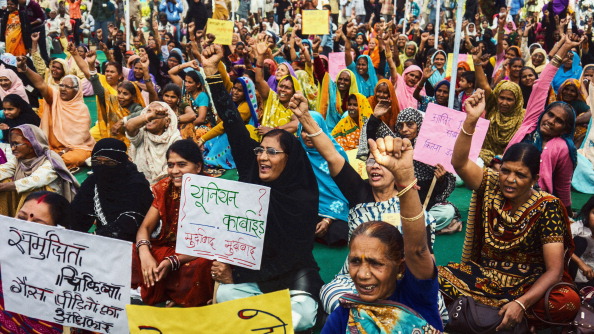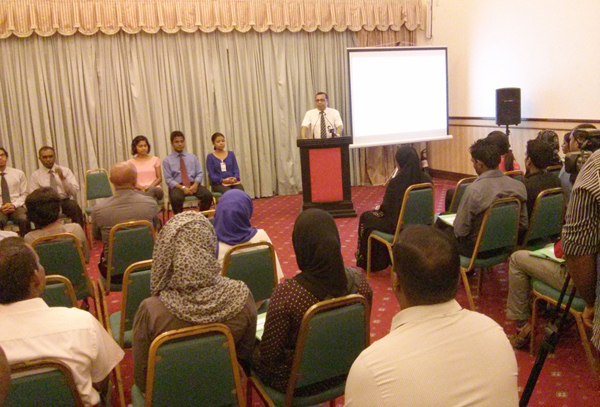In the name of God, The Most Beneficent, The Most Merciful.
Honourable UN Secretary General Mr Ban Ki-moon,
Respected President General Assembly Vuk Jeremic
Honourable UN envoy for Global education Mr Gordon Brown,
Respected elders and my dear brothers and sisters;
Today, it is an honour for me to be speaking again after a long time.
Being here with such honourable people is a great moment in my life.
I don't know where to begin my speech. I don't know what people would
be expecting me to say. But first of all, thank you to God for whom we
all are equal and thank you to every person who has prayed for my fast
recovery and a new life. I cannot believe how much love people have
shown me. I have received thousands of good wish cards and gifts from
all over the world. Thank you to all of them. Thank you to the children
whose innocent words encouraged me. Thank you to my elders whose prayers
strengthened me.
I would like to thank my nurses, doctors and all of the staff of the
hospitals in Pakistan and the UK and the UAE government who have helped
me get better and recover my strength. I fully support Mr Ban Ki-moon
the Secretary-General in his Global Education First Initiative and the
work of the UN Special Envoy Mr Gordon Brown. And I thank them both for
the leadership they continue to give. They continue to inspire all of
us to action.
Dear brothers and sisters, do remember one thing. Malala day is not my
day. Today is the day of every woman, every boy and every girl who have
raised their voice for their rights. There are hundreds of Human rights
activists and social workers who are not only speaking for human rights,
but who are struggling to achieve their goals of education, peace and
equality. Thousands of people have been killed by the terrorists and
millions have been injured. I am just one of them.
So here I stand... one girl among many.
I speak – not for myself, but for all girls and boys.
I raise up my voice – not so that I can shout, but so that those without a voice can be heard.
Those who have fought for their rights:
Their right to live in peace.
Their right to be treated with dignity.
Their right to equality of opportunity.
Their right to be educated.
Dear Friends, on the 9th of October 2012, the Taliban shot me on the
left side of my forehead. They shot my friends too. They thought that
the bullets would silence us. But they failed. And then, out of that
silence came, thousands of voices. The terrorists thought that they
would change our aims and stop our ambitions but nothing changed in my
life except this: Weakness, fear and hopelessness died. Strength, power
and courage was born. I am the same Malala. My ambitions are the same.
My hopes are the same. My dreams are the same.
Dear sisters and brothers, I am not against anyone. Neither am I here
to speak in terms of personal revenge against the Taliban or any other
terrorists group. I am here to speak up for the right of education of
every child. I want education for the sons and the daughters of all the
extremists especially the Taliban.
I do not even hate the Talib who shot me. Even if there is a gun in my
hand and he stands in front of me. I would not shoot him. This is the
compassion that I have learnt from Muhammad-the prophet of mercy, Jesus
christ and Lord Buddha. This is the legacy of change that I have
inherited from Martin Luther King, Nelson Mandela and Muhammad Ali
Jinnah. This is the philosophy of non-violence that I have learnt from
Gandhi Jee, Bacha Khan and Mother Teresa. And this is the forgiveness
that I have learnt from my mother and father. This is what my soul is
telling me, be peaceful and love everyone.
Dear sisters and brothers, we realise the importance of light when we
see darkness. We realise the importance of our voice when we are
silenced. In the same way, when we were in Swat, the north of Pakistan,
we realised the importance of pens and books when we saw the guns.
The wise saying, “The pen is mightier than sword” was true. The
extremists are afraid of books and pens. The power of education
frightens them. They are afraid of women. The power of the voice of
women frightens them. And that is why they killed 14 innocent medical
students in the recent attack in Quetta. And that is why they killed
many female teachers and polio workers in Khyber Pukhtoon Khwa and FATA.
That is why they are blasting schools every day. Because they were and
they are afraid of change, afraid of the equality that we will bring
into our society.
I remember that there was a boy in our school who was asked by a
journalist, “Why are the Taliban against education?” He answered very
simply. By pointing to his book he said, “A Talib doesn't know what is
written inside this book.” They think that God is a tiny, little
conservative being who would send girls to the hell just because of
going to school. The terrorists are misusing the name of Islam and
Pashtun society for their own personal benefits. Pakistan is
peace-loving democratic country. Pashtuns want education for their
daughters and sons. And Islam is a religion of peace, humanity and
brotherhood. Islam says that it is not only each child's right to get
education, rather it is their duty and responsibility.
Honourable Secretary General, peace is necessary for education. In many
parts of the world especially Pakistan and Afghanistan; terrorism, wars
and conflicts stop children to go to their schools. We are really tired
of these wars. Women and children are suffering in many parts of the
world in many ways. In India, innocent and poor children are victims of
child labour. Many schools have been destroyed in Nigeria. People in
Afghanistan have been affected by the hurdles of extremism for decades.
Young girls have to do domestic child labour and are forced to get
married at early age. Poverty, ignorance, injustice, racism and the
deprivation of basic rights are the main problems faced by both men and
women.
Dear fellows, today I am focusing on women's rights and girls'
education because they are suffering the most. There was a time when
women social activists asked men to stand up for their rights. But, this
time, we will do it by ourselves. I am not telling men to step away
from speaking for women's rights rather I am focusing on women to be
independent to fight for themselves.
Dear sisters and brothers, now it's time to speak up.
So today, we call upon the world leaders to change their strategic policies in favour of peace and prosperity.
We call upon the world leaders that all the peace deals must protect
women and children's rights. A deal that goes against the dignity of
women and their rights is unacceptable.
We call upon all governments to ensure free compulsory education for every child all over the world.
We call upon all governments to fight against terrorism and violence, to protect children from brutality and harm.
We call upon the developed nations to support the expansion of educational opportunities for girls in the developing world.
We call upon all communities to be tolerant – to reject prejudice based
on cast, creed, sect, religion or gender. To ensure freedom and
equality for women so that they can flourish. We cannot all succeed when
half of us are held back.
We call upon our sisters around the world to be brave – to embrace the
strength within themselves and realise their full potential.
Dear brothers and sisters, we want schools and education for every
child's bright future. We will continue our journey to our destination
of peace and education for everyone. No one can stop us. We will speak
for our rights and we will bring change through our voice. We must
believe in the power and the strength of our words. Our words can change
the world.
Because we are all together, united for the cause of education. And if
we want to achieve our goal, then let us empower ourselves with the
weapon of knowledge and let us shield ourselves with unity and
togetherness.
Dear brothers and sisters, we must not forget that millions of people
are suffering from poverty, injustice and ignorance. We must not forget
that millions of children are out of schools. We must not forget that
our sisters and brothers are waiting for a bright peaceful future.
So let us wage a global struggle against illiteracy, poverty and
terrorism and let us pick up our books and pens. They are our most
powerful weapons.
One child, one teacher, one pen and one book can change the world.
Education is the only solution. Education First.




